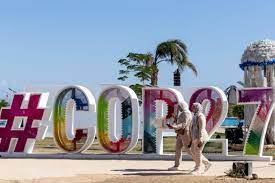Despite efforts by certain states to limit the use of the fuel, the president of the African Development Bank told reporters that any agreement reached at the COP27 climate conference should take into account the right of African nations to utilize their natural gas supplies.
One of the main issues during the negotiations is reaching an agreement on fossil fuels, with some nations, like India, eager to phase out the use of all such fuels, including gas, according to sources.
On Monday evening, a draft text from the conference organizers was delivered; it made no mention of fossil fuels. Although it serves as the foundation for any deal, the crucial final text has not yet been agreed upon.
Akinwumi Adesina, president of the African Development Bank, stated Friday on the margins of the U.N. conference taking place in Sharm el-Sheikh, Egypt, “Africa must have natural gas to complement its renewable energy.”
According to him, even if Africa tripled its present rate of natural gas production, its share of world emissions would only increase by 0.67%.
One focus of the conference has been on countries quickening their transition to renewable energy, as the world is currently on track to miss its climate goal of keeping global warming to 1.5 degrees Celsius above the pre-industrial average by the middle of the century.
According to Adesina, the African Development Bank (AfDB) wants to mobilize $25 billion through the African Adaptation Acceleration Program, the largest initiative of its kind. Additionally, it would invest 85% of its funds in renewable energy between 2016 and 2021.
Despite this, he maintained that because renewable energy sources are intermittent, natural gas is necessary to balance out the electrical supply.
“We must acknowledge the uniqueness of Africa. The world’s highest rate of energy poverty is found in Africa “Added Adesina.
The use of natural gas in Africa’s energy mix to provide electricity for the 600 million people who do not currently have access to it piques my interest.
According to Adesina, developed nations have released about 2,400 gigatonnes of climate-damaging carbon emissions since the industrial revolution, leaving only 400 gigatonnes to be released if the world is to meet its temperature goal.
Therefore, Africa, which didn’t actually emit anything, shouldn’t now be punished for being unable to use even a small amount of gas to supplement its natural resources.




















